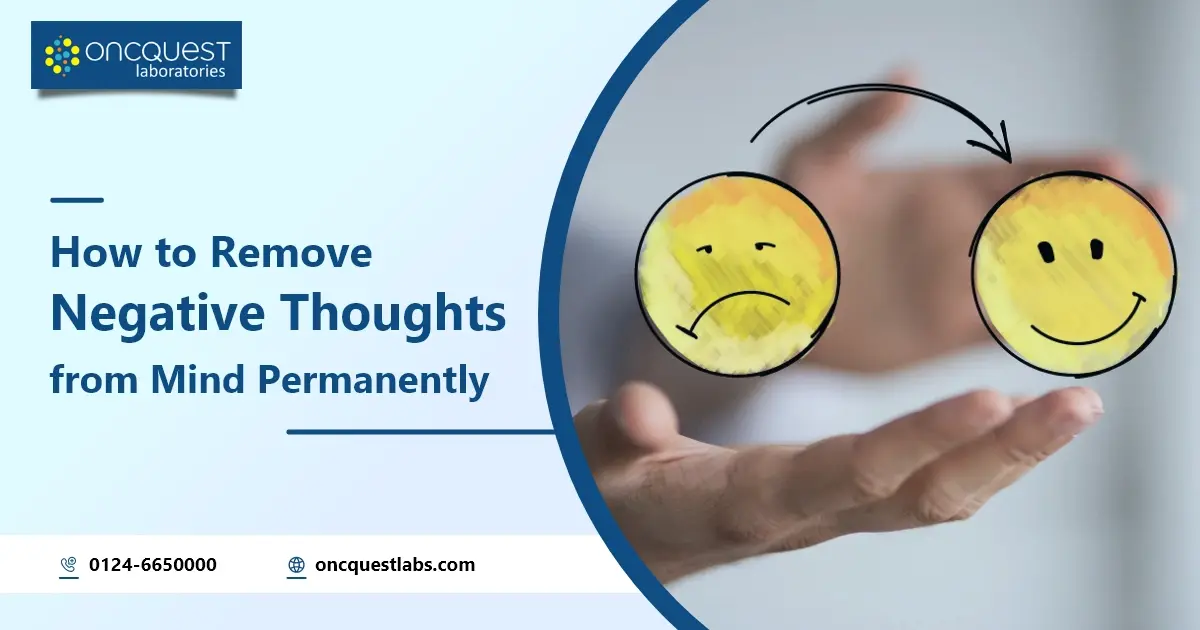Negative thoughts can be like a dark cloud hanging over your life, affecting your mood, relationships, and overall well-being. While it’s normal to experience negativity from time to time, you can take steps to remove negative thoughts from your mind permanently. In this blog, we’ll explore practical strategies to help you achieve mental clarity and a more positive outlook on life.
Contents
What causes negative thought in mind
Negative thoughts can be triggered by a variety of factors, and they can vary from person to person. Here are some common causes of negative thoughts:
1. Stress and Anxiety: High-stress levels and anxiety can lead to negative thinking patterns. When you’re under pressure, your mind may generate pessimistic thoughts about the future or your ability to cope with challenges.
2. Past Experiences: Negative events or traumatic experiences from your past can leave a lasting impact on your thought patterns. Unresolved past issues can resurface as negative thoughts.
3. Self-Criticism: Excessive self-criticism and low self-esteem can lead to a negative self-image. People who are overly self-critical often have negative thoughts about themselves and their capabilities.
4. Comparison: Comparing yourself to others, especially in the age of social media, can lead to feelings of inadequacy and negative self-comparisons.
5. Environmental Factors: The people you surround yourself with and the environment you’re in can influence your thoughts. Negative or toxic relationships and environments can foster negative thinking.
6. Media and News: Constant exposure to negative news and media can shape your perception of the world and contribute to negative thinking.
7. Health Issues: Physical health problems or chronic illnesses can affect your mental well-being and lead to negative thoughts.
8. Lack of Sleep: Sleep deprivation can impact your mood and cognitive function, making it more likely for negative thoughts to arise.
9. Unrealistic Expectations: Setting overly high or unattainable goals can lead to feelings of failure and negativity when those expectations aren’t met.
10. Chemical Imbalances: Some individuals may have imbalances in brain chemistry that can contribute to negative thoughts. In such cases, professional treatment or therapy may be necessary.
It’s important to note that negative thoughts are a natural part of human experience. Everyone experiences them from time to time. However, when negative thoughts become pervasive, interfere with daily life, or lead to mental health issues like depression or anxiety, it’s important to seek help from a mental health professional. They can provide strategies and support to manage and alleviate negative thought patterns.
How to remove negative thoughts from mind permanently
Negative thoughts can be like uninvited guests that linger in your mind, casting shadows over your emotions and experiences. While it’s not realistic to expect a life entirely free of negativity, it is possible to minimize and manage these intrusive thoughts to lead a more fulfilling and optimistic life. In this guide, we’ll delve into practical techniques and strategies that can help you effectively remove negative thoughts from your mind, working towards a more positive and resilient mindset. Whether you’re dealing with occasional pessimism or persistent negativity, these methods can be your compass to mental clarity and long-term well-being.
1. Self-awareness
The first step in banishing negative thoughts is to become self-aware. Pay attention to your thought patterns, recognizing when negativity creeps in. Journaling can be a useful tool to track these thoughts and identify common triggers.
2. Challenge your thoughts
Once you identify negative thoughts, challenge them. Ask yourself if they are based on facts or assumptions. Are they overly critical or self-defeating? Replace them with more realistic and constructive thoughts.
3. Mindfulness and meditation
Mindfulness and meditation can help you stay present and reduce rumination on negative thoughts. By focusing on the here and now, you can prevent your mind from wandering into negativity.
4. Surround yourself with positivity
Your environment plays a significant role in shaping your thoughts. Surround yourself with positive people, inspirational content, and a supportive atmosphere to counteract negativity.
5. Gratitude practice
Develop a daily gratitude practice. Count your blessings and reflect on the positive aspects of your life. This can shift your focus away from negativity and towards appreciation.
6. Set achievable goals
Negative thoughts often arise from feeling overwhelmed or helpless. Break down your goals into smaller, achievable tasks. This will give you a sense of accomplishment and boost your confidence.
7. Seek professional help
If negative thoughts persist and significantly impact your life, consider seeking help from a therapist or counselor. They can provide you with tools and strategies to manage and eliminate negative thought patterns.
8. Physical health
There’s a strong connection between physical and mental health. Regular exercise, a balanced diet, and adequate sleep can have a profound impact on your overall well-being, reducing the occurrence of negative thoughts.
9. Limit exposure to negativity
Be mindful of the content you consume, whether it’s news, social media, or toxic relationships. Reducing exposure to negative influences can help you maintain a more positive mindset.
10. Stay patient and persistent
Banishing negative thoughts permanently is an ongoing process. It’s essential to be patient with yourself and stay persistent. Over time, with consistent effort, you can rewire your thought patterns.
Conclusion
Negative thoughts may have a stronghold on your mind, but they don’t have to be permanent residents. By practicing self-awareness, challenging your thoughts, and adopting a range of strategies, you can banish negativity and create a more positive and fulfilling life. Remember that it’s a journey, and every small step you take leads you closer to mental freedom and happiness.
Frequently asked Questions
Q1: What is the main cause of negative thinking?
A1: Negative thinking can stem from a multitude of factors, and personal experiences, such as going through a traumatic event, can certainly contribute to it. However, research is shedding light on the substantial influence that specific mental health disorders have on the persistent development of gloomy or pessimistic thoughts.
Q2: Is it ok to be an overthinker?
A2: No, overthinking is not ok. At times, overthinking can offer valuable insights into your core values and areas where personal growth is possible. As Foley notes, it’s important to recognize that not all instances of overthinking are detrimental. However, it crosses into unhealthy territory when it becomes a hindrance, impeding your ability to take action and negatively impacting your daily life and overall well-being.
Q3: How can I sleep without overthinking?
A3: Establish a wind-down routine for yourself. Approximately an hour before bedtime, create a period to unwind and relax. Steer clear of watching television, as it can further stimulate your brain. Disconnect from your phone and tablets to avoid the sleep-disrupting effects of blue light. Dedicate a few hours before sleep to prepare your mind and body for a restful night.





